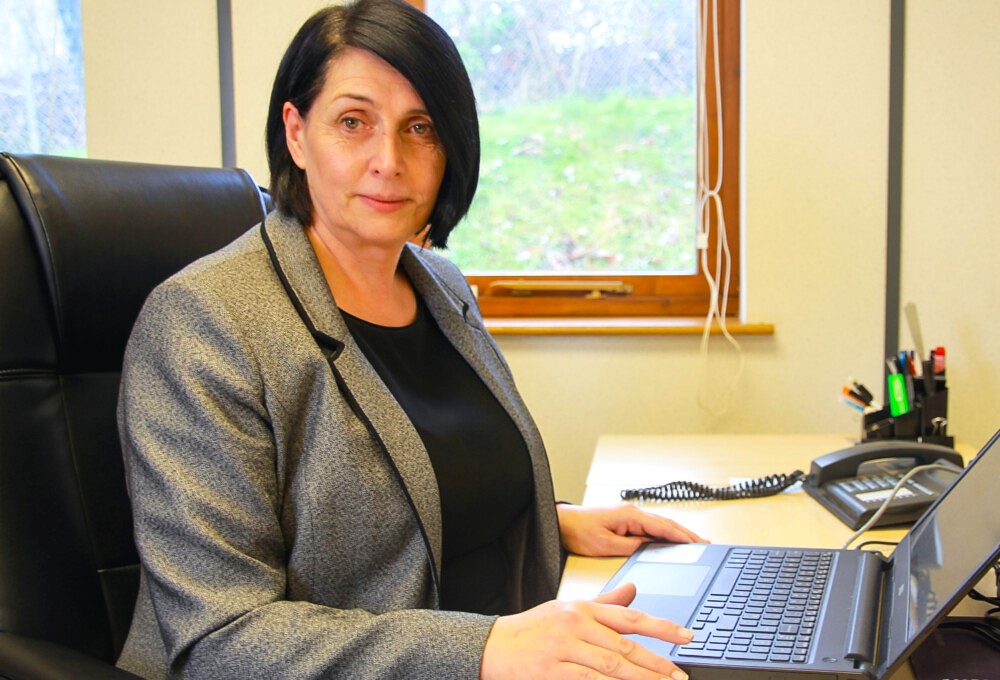Business
Young entrepreneur’s jewellery business set for take-off with backing from the Development Bank of Wales

DESIGNER, jeweller and silversmith Maggie Cross is expanding her boutique jewellery business with the help of a microloan from the Development Bank of Wales.
The 29-year old single mum makes minimal but fun jewellery using traditional silversmithing techniques and recycled precious metals from her studio in Cardigan.
Maggie received a degree in Jewellery Making in 2013 from The School of Jewellery in Birmingham.
After falling pregnant in her final year of studying, she recently began following her passion of making gorgeous jewellery.
She began by making pieces and promoting them on her personal Instagram account. In 2020, during the pandemic, Maggie opened her store.
Now living in Cardigan, Maggie owns an “open studio” where she creates her beautiful pieces. All of her work is available on her store maggiecross.co.uk, however, people are able to visit her studio in the Canolfan Teifi Arcade in Cardigan.
Maggie creates bespoke jewellery which is ethically made using recycled precious materials. Her aim is to make her brand as sustainable as possible. At the bench, Maggie uses eco-silver sheet, and the casting company she often works with, also only uses recycled metals.
She is looking forward to the upcoming release of her smiley signet rings which she has been teasing for a while.
Alongside creating jewellery, Maggie also offers workshops, in which she will work with you to create your own bespoke wax ring. She also sells ring carving kits on her website that allow you to create your own ring at home.
Speaking about the grant, Maggie said: “I’m aiming to make my brand as sustainable as possible by only using recycled and environmentally friendly materials. Since completing my degree my time has been spent building up my client base and social media following and the time is now right to expand my offering.

“The £5,000 loan from the Development Bank has made all the difference because it means that I’ve now got the working capital to invest in my products. Their support also means that I’ve got the confidence that the business has the potential to take off. I’m very grateful for their help.”
A £5,000 loan from the Development Bank has been used to invest in stock, casting and materials as she prepares to scale-up to meet customer demand. Maggie is also preparing to launch a programme of workshops.
The Development Bank of Wales was set up by the Welsh Government to support the economy of Wales by making it easier for businesses to get the finance needed to start up, strengthen and grow.
The purpose of the Development Bank is to unlock potential in the economy of Wales by increasing the provision of sustainable, effective finance in the market.
It was established in October 2017 as a foundational organisation for the delivery of public sector financial products, assisting micro to medium-sized businesses in Wales, and increasing the supply of finance.
In total, the Development Bank invested £197.6 million in the 2020/21 financial year. While the Covid-19 Wales Business Loan Scheme (CWBLS) provided £92 million in loans to help businesses through the pandemic, investments in all of our BAU funds remained stable.
£105.6 million was provided to businesses in all sectors of the economy and at all stages of development.
Assistant Investment Executive Charlotte Price from the Development Bank of Wales said: “We are pleased to be working with young entrepreneurs like Maggie, recognising that we have an important part to play in the Welsh Government’s commitment to supporting them.
“Maggie has been developing the business for a few years and has already built up a strong following. She is passionate about what she does so we have every confidence that she will make a success of the business.”
The £32.5 million Wales Micro Loan Fund is financed entirely by the Welsh Government. Loans between £1,000 and £50,000 are available for sole traders, small businesses and social enterprises based in Wales.
Business
Pembrokeshire industrial jobs ‘could be at risk’ as parties clash over investment

TRADE unions have warned that hundreds of industrial jobs in Pembrokeshire could be at risk without stronger long-term support for Welsh manufacturing, as political parties set out competing approaches ahead of the Senedd elections.
TUC Cymru says its analysis suggests 939 industrial jobs in Pembrokeshire could be vulnerable if investment in clean industrial upgrades were withdrawn, warning that policies proposed by Reform UK, and to a lesser extent the Conservatives, pose the greatest risk to industrial employment.
The warning comes as the union body launched its “Save Welsh Industry – No More Site Closures!” campaign at events in Deeside and Swansea, calling on all political parties to commit to a five-point plan to protect and future-proof Welsh industry.
According to TUC Cymru, jobs at risk locally include 434 in automotive supply chains, 183 in rubber and plastics and 75 in glass manufacturing. The union body says these sectors rely on continued investment to remain competitive and avoid offshoring.
TUC Cymru said its modelling focused on industries most exposed to closure or relocation if industrial modernisation and decarbonisation are not delivered. It argues that without sustained public and private investment, Welsh manufacturing faces further decline.
A GMB member working at Valero in Pembrokeshire said: “It’s clear Nigel Farage has no clear plan. I can see this industry collapsing under his policies. We need support, not division. His way will lead to job losses across the board and the lights will go out.”
The union body stressed that all parties need to strengthen their industrial policies, but claimed Reform UK’s stated opposition to net zero-related investment would place the largest number of jobs at risk across Wales, estimating that almost 40,000 industrial jobs nationally could be affected. Conservative policies were also criticised, though the TUC said the likelihood of job losses under the Conservatives was lower.
Labour has rejected claims that Welsh industry is being neglected, pointing to recent investment announcements made at the Wales Investment Summit, where more than £16bn worth of projects were highlighted as being in the pipeline across Wales.
Ministers said the summit demonstrated growing investor confidence, with projects linked to clean energy, advanced manufacturing, ports, digital infrastructure and battery storage, and thousands of jobs expected as schemes move from planning into delivery.
Labour has argued that public investment is being used to unlock private sector funding, particularly in industrial regions, and says modernising industry is essential to keeping Welsh manufacturing competitive while protecting long-term employment.
At UK level, the party has also highlighted its National Wealth Fund and GB Energy commitments, which it says will support domestic supply chains, reduce long-term energy costs for industry and help secure both existing and future jobs.
Opposition parties and some business groups have questioned whether all announced projects will translate into permanent employment, arguing that greater clarity is needed on timescales and delivery.
Reform UK has argued that scrapping net zero policies would cut public spending and reduce costs for households and businesses, while the Conservatives have pledged to roll back climate-related targets and reduce regulation on industry.
Unions dispute those claims, warning that higher electricity prices and a lack of investment would make Welsh industry less competitive internationally.
TUC Cymru President Tom Hoyles said Welsh industry needed urgent action from all parties to survive and thrive in the 21st century, warning that policies which sought to turn back the clock could put thousands of Welsh jobs at risk.
With industrial areas including Flintshire, Neath Port Talbot and Carmarthenshire also identified as facing significant pressures, the future of Welsh manufacturing is expected to remain a key political issue in the run-up to the Senedd elections.
Business
New digital toolkit aims to future-proof rural Welsh businesses in AI search era

A NEW digital toolkit developed in Ceredigion is being hailed as a potential game-changer for small businesses in rural Wales, as artificial intelligence reshapes how customers discover local services online.
Created by Antur Cymru Enterprise, the SMART Busnes programme is giving Welsh SMEs an early foothold in Answer Engine Optimisation (AEO) – a rapidly emerging discipline focused on how businesses appear within AI-generated search responses.
As AI-driven tools increasingly replace traditional search results with instant, conversational answers, SMART Busnes – supported by the UK Shared Prosperity Fund – has launched one of the first practical AEO toolkits available in Wales.
The initiative is being led by Digital Business Advisor Lynne Rees and centres on a new insight framework known as Agentic AEO. The approach is designed to help rural and micro-businesses remain visible online as search engines and AI platforms prioritise structured, easily interpreted information over conventional keyword-based webpages.

Kevin Harrington, Project Manager for SMART Busnes, said the shift represents a fundamental change in how businesses need to think about their online presence.
“AI search is here to stay, and our Agentic AEO insight series isn’t a tweak – it’s a reset,” he said.
“It’s about helping Welsh SMEs show up wherever customers search: on Google, on social media, and increasingly within AI-generated answers. This gives rural businesses access to the kind of digital advantage that large brands often pay thousands of pounds for.”
Traditional search engine optimisation is already being overtaken by AI-led systems such as Google’s Search Generative Experience and tools like ChatGPT, which provide direct responses rather than lists of links.
For small businesses, this presents a growing risk. If online content is not structured in a way AI tools can understand, businesses may fall below the point where potential customers ever see them.
Agentic AEO focuses on improving clarity, structure and user intent across websites, social media platforms and Google Business Profiles. By presenting information in formats AI systems can easily process, businesses can improve both visibility and credibility within automated responses.
The SMART Busnes AEO Insight Series provides practical support, including step-by-step guidance on restructuring webpages, examples of effective layouts, and tailored AI prompts to help business owners produce optimised content quickly and affordably. Even modest changes – such as a website review, targeted content update or short advisory session – can influence how a business appears in search results over the coming year.

Antur Cymru chief executive Bronwen Raine said the programme was designed to help businesses adapt to long-term change.
“SMART Busnes was created to support small businesses through change, not simply to chase trends,” she said.
“The Agentic AEO insight series shows how Shared Prosperity Fund investment is driving genuine innovation, building confidence, skills and sustainability across local economies.”
With many SEO providers in Wales still focused on older techniques, SMART Busnes is positioning Ceredigion and the wider Mid and West Wales region at the forefront of AEO adoption.
By translating emerging digital theory into accessible, practical support, the programme aims to strengthen resilience among rural enterprises and ensure they remain visible, trusted and competitive in an AI-led future.
More information about SMART Busnes and the support offered by Antur Cymru Enterprise is available via the organisation’s website.
Business
Unemployment in Wales rises to highest level in a decade

Welsh jobless rate hits 6.1% as Conservatives blame Labour and Plaid budget deal
UNEMPLOYMENT in Wales has climbed to its highest level in ten years, according to the latest labour market figures.
Statistics covering September and October 2025 show the unemployment rate in Wales now stands at 6.1 per cent — the highest since mid-2015. The figure represents a rise of 1.4 percentage points compared with the previous quarter and remains higher than the UK average.
The increase comes amid continuing pressure on households and businesses, with higher costs, weaker growth and ongoing uncertainty affecting parts of the UK economy.
The figures have prompted criticism from the Welsh Conservatives, who have blamed both the UK Labour Government and the Welsh Government for what they describe as a deepening employment crisis in Wales.
Commenting on the data, Welsh Conservative Shadow Cabinet Secretary for Economy and Energy, Samuel Kurtz MS said the Welsh Government needed to take urgent action.
“Labour and Plaid’s unemployment crisis is deepening; the Welsh Government must get a grip,” he said.
“Rachel Reeves’ latest budget has hit business hard, with unemployment rising every month under Labour and yet again higher here in Wales than elsewhere.
“Labour can’t be trusted with the economy. The Welsh Conservatives are offering a bold and costed tax-cutting agenda to kickstart growth, including the abolition of stamp duty and cuts to business rates, but Plaid and Labour’s stitch-up of a budget deal will mean more of the same economic decline.”
The Welsh Government has previously argued that employment figures are influenced by wider global and UK-wide economic challenges, as well as long-standing structural issues within the Welsh economy, including lower average wages and higher levels of economic inactivity.
Ministers have pointed to investment in skills, apprenticeships and infrastructure as part of efforts to support jobs and stimulate growth, while also noting that key economic levers remain reserved to Westminster.
Economists caution that quarterly unemployment figures can fluctuate and should be viewed alongside longer-term trends, including economic inactivity and underemployment.
However, with unemployment now at its highest level for a decade, pressure is increasing on both the UK and Welsh governments to demonstrate how their economic policies will deliver sustained job growth in Wales.
-

 Crime7 days ago
Crime7 days agoPhillips found guilty of raping baby in “worst case” judge has ever dealt with
-

 Crime6 days ago
Crime6 days agoKilgetty scaffolder sentenced after driving with cocaine and in system
-

 Crime6 days ago
Crime6 days agoHousing site director sentenced after failing to provide breath sample following crash
-

 News2 days ago
News2 days agoDyfed-Powys Police launch major investigation after triple fatal crash
-

 Crime6 days ago
Crime6 days agoMotorist banned for three years after driving with cannabis in system
-

 Crime3 days ago
Crime3 days agoMan spared jail after baseball bat incident in Milford Haven
-

 Crime16 hours ago
Crime16 hours agoMan sent to Crown Court over historic indecent assault allegations
-

 Education5 days ago
Education5 days agoTeaching assistant struck off after asking pupil for photos of her body




























